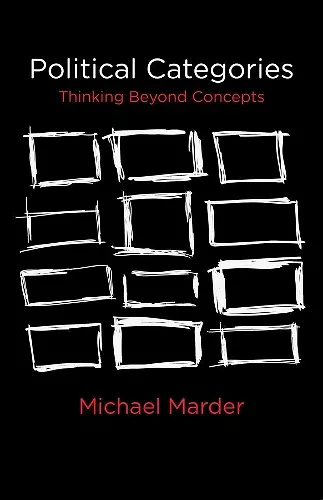Political Categories
Thinking Beyond Concepts
Format:Paperback
Publisher:Columbia University Press
Published:15th Mar '19
Should be back in stock very soon

Western philosophy has been dominated by the concept or the idea—the belief that there is one sovereign notion or singular principle that can make reality explicable and bring all that exists under its sway. In modern politics, this role is played by ideology. Left, right, or center, political schools of thought share a metaphysics of simplification. We internalize a dominant, largely unnoticeable framework, oblivious to complex, plural, and occasionally conflicting or mutually contradictory explanations for what is the case.
In this groundbreaking work, Michael Marder proposes a new methodology for political science and philosophy, one which he terms “categorial thinking.” In contrast to the concept, no category alone can exhaust the meaning of anything: categories are so many folds, complications, respectful of multiplicity. Ranging from classical Aristotelian and Kantian philosophies to phenomenology and contemporary politics, Marder's book offers readers a theoretical toolbox for the interpretation of political phenomena, processes, institutions, and ideas. His categorial apparatus encompasses political temporality and spatiality; the revolutionary and conservative modalities of political actuality, possibility, and necessity; quantitative and qualitative approaches to the study of political reality; the meaning of political relations; and various senses of political being. Under this lens, the political appears not as a singular concept but as a family of categories, allowing room for new, plural, and often antagonistic ideas about the state, the people, sovereignty, and power.
Michael Marder's patient and lucid work reminds us how categories and concepts are different, and that a phenomenological approach, allied with Kantian reflection, can help us think about political matters through an expanded and refined understanding of political categories. In a political world where simplistic reductions tend to reign, Marder offers a thoughtful reconsideration of categories as offering greater descriptive power and critical complexity than concepts that suppress the specificity of political phenomena. This is an important book that gives us both the example and the ideal of a political philosophy tasked with understanding the field of conflict in the service of an expansive pluralism. -- Judith Butler, Maxine Elliot Professor of Comparative Literature and Critical Theory, University of California, Berkeley
Michael Marder's Political Categories is much more than a book about politics. It takes a step back and looks at the conceptual apparatus we rely on when we talk about politics and engage in it. As such, it is indispensable for everyone who is not only politically active but also wants to know what they are doing when they are politically active. -- Slavoj Žižek, author of Disparities and The Incontinence of the Void
Political Categories proposes nothing less than a new way of thinking about politics and such political ideas and institutions as the state, sovereignty, power, and revolution. The question is how to define what is proper or singular to politics without isolating it from other spheres of human activity and thought. What makes politics politics? In this book, Marder finds a novel way of viewing the meaning of politics and its relation to nonpolitical realities. -- Daniel Innerarity, author of Governance in the New Global Disorder
Political Categories is undoubtedly one of the most interesting books today for a new phenomenological approach to political theory...it sparks the curiosity of the reader. -- Mees van Hulzen, Leipzig University * Phenomenological Reviews *
This is a remarkable book -- one of the most challenging and thought-provoking I have encountered in a very long time and, for this reason alone, richly deserving of attention. -- Nathan J. Jun, Midwestern State University * Notre Dame Philosophical Reviews *
This is perhaps the most original and thought-provoking book of political theory this reviewer has read in years. Scholars in both political philosophy and political science will benefit from it . . . Highly recommended. * Choice *
- Winner of CHOICE, Outstanding Academic Title 200
ISBN: 9780231188692
Dimensions: unknown
Weight: unknown
272 pages